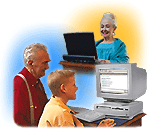Getting started with home networking

It's been years since businesses discovered the advantages of using computer networks to share printers, programs, and file folders. If you have two or more computers at home, you can use the easy home networking features in Windows Me to set up a network of your own.
Even if you're not a computer technician, the process is fairly simple, thanks to both Windows Me and new hardware technology. If you have a new computer, it may even have come with all the required hardware. You can also shop for individual parts yourself or buy a kit that includes all the necessary hardware. Either way, Windows Me gets you on the road to networking nirvana.
Why network?
If you haven't worked on a network before, you may be asking yourself, "What's the point?" By connecting two or more computers, you can expand computing options for everyone in your family, and save money by using a single printer and Internet connection. A network can make your life easier by allowing you to share file folders and programs, and even play games against family members, using multiple computers.
Many families who upgrade to a faster computer put the old one in the kids' room. But when homework time comes, the new computer with its laser printer and high-speed Internet connection are still in demand. Your older computer doesn't have to sit idle, and you don't have to sacrifice your computer time for your kids. With the right network setup, you and your kids can print to the same printer from different computers, and research different projects on the Internet at the same time!
Home networking: putting it in motion
Setting up a network doesn't have to be complicated, but it does require careful planning before you buy any network equipment.
Basic requirements
At least one computer—preferably the newest—must be running Windows Me. If you plan to use the Internet across your network, this computer should also have an Internet connection. All other computers in the planned network can run Windows Me, Windows 95, or any version of Windows 98. Your Windows Me computer will become your server, or host—the central processor for your network. The other computers will become clients.
Note You can even use Macintosh or UNIX/Linux computers on your home network; however, these computers might require additional software to share folders or printers. Check your computer's documentation for more information about how to use it on a Microsoft Windows network.
Information for this article was provided by the Windows Me Help and Support team. Similar articles are available as updates to Windows Me Help and Support.
|
